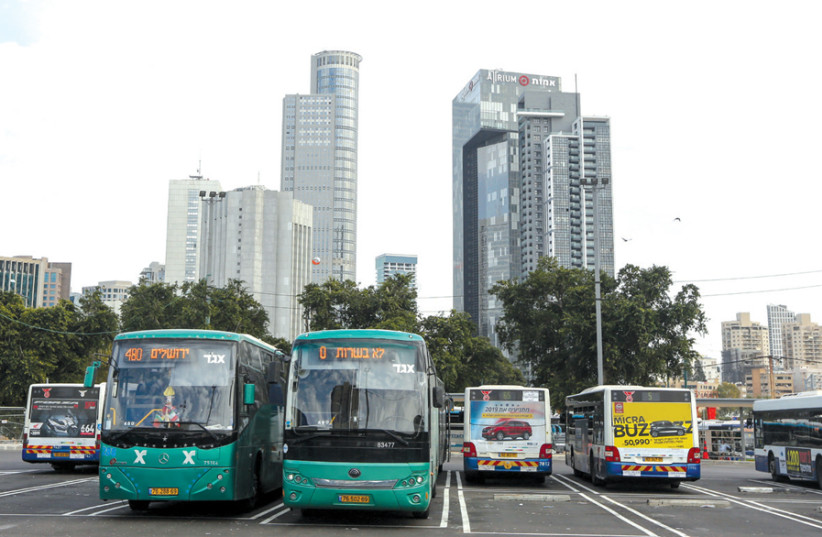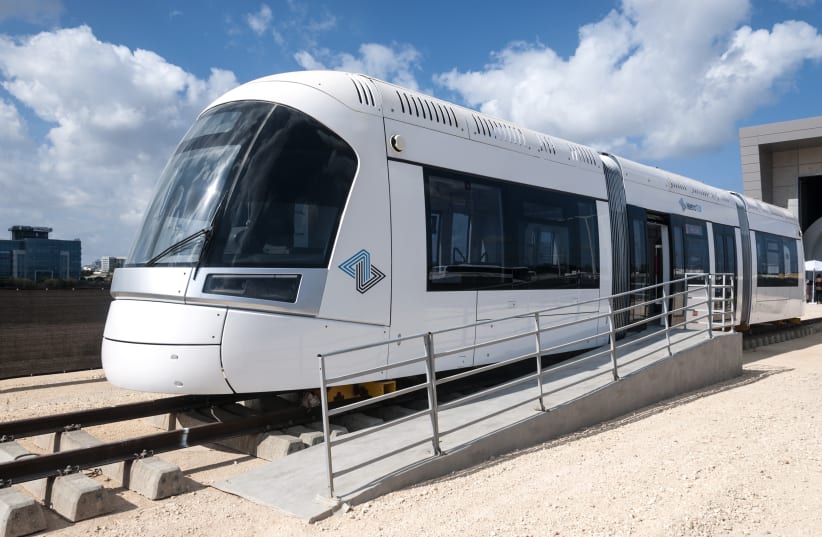Forty-three percent of Jewish Israeli citizens would “probably” or “certainly” use public transportation on Shabbat if they had the opportunity to do so, according to the Israel Democracy Institute's (IDI) annual religion and state yearbook, parts of which were published this week.
Forty-two percent said they would “probably not” or “certainly not” use public transportation on Shabbat, and 5% did not know, the poll found.
All haredi and nearly all self-identifying national religious citizens said they would “certainly not” use public transportation on Shabbat, and 87% of people who identified as “traditional-religious” said they would either “certainly not” or “probably not” do so. However, 42% of people who defined themselves as “traditional–non religious” and 75% of people who identified as secular said they would “certainly” or “probably” use public transport on Saturdays if they were given the chance.
The data was published amidst a push by Transportation Minister and Labor party chair Merav Michaeli in recent weeks to enable public transport on Saturdays in wider swathes of the country. Out of 2,913 bus lines in Israel, only 7% continue to run fully on Saturdays, and an additional 3% run until shortly after Shabbat has begun or begin to run shortly before it ends, the study found.
Why is this issue being brought up now?

The issue flared up at the end of August, when it became apparent that the new Tel Aviv Light Rail, which is scheduled to become operational within the next few months, was not going to run on Shabbat.
“It is inconceivable that such a huge investment of billions of shekels will just be inoperative for a day and a half a week. This is a blockade on the weekends that Israelis are no longer ready to tolerate,” Michaeli said in a speech on August 25. “If this government had served a full term, I have no doubt that we would already be seeing buses on Shabbat.”
“Initially, it was more important to protect the coalition, to keep together the government that put Netanyahu out of office. We did the preparatory work and didn’t make it public,” Michaeli said, referring to Alternate Prime Minister Naftali Bennett’s veto on bringing the issue up in the government.
"If this government had served a full term, I have no doubt that we would already be seeing buses on Shabbat."
Merav Michaeli
The coalition’s collapse provided a “historic opportunity” in this regard, she said.
“A majority of over 70% of Israelis want public transportation on Shabbat, including religious people and even some ultra-Orthodox – and that’s only when you poll Jewish Israelis. If we add Arab citizens, there is an overwhelming majority,” she added at the time.
“The time has come for the government to serve the public with what it wants and really needs,” she said. “Public transport every day of the week is necessary, so that we can make it a real alternative. People can give up on owning a car and know that they can travel with their family on the weekend.”
Debating the public transportation on Shabbat
Michaeli stressed on many occasions since then that haredi and religious cities would not be forced to do anything – and that, while the option should be open to everyone, municipalities will still be able to shut down on Shabbat if that is their wish.
Still, many of the haredi MKs, who oppose all public transportation on Shabbat, harshly criticized her for bringing up the issue in an interim government, and accused her of using it as an election ploy.
"What Merav Michaeli is doing with public transportation on Shabbat is a scandal. She is disgracing the Labor party and disgracing herself as a minister," United Torah Judaism (UTJ) MK Moshe Gafni said in an interview on Kol Hai Radio on August 31.
“What Merav Michaeli is doing with public transportation on Shabbat is a scandal. She is disgracing the Labor party and disgracing herself as a minister,” United Torah Judaism (UTJ) MK Moshe Gafni said in an interview on Kol Hai Radio on August 31.
Gafni added in the UTJ campaign opening event on Wednesday, “They want to destroy every spark of Judaism. Merav Michaeli is acting like a savage on the issue of public transportation on Shabbat. The state’s laws do not matter to her, and she is only thinking about her campaign.”
Michaeli addressed the issue at a conference on religion and state held at the IDI on Wednesday.
“I am against expanding commerce on Shabbat because I approach this issue from a ‘social democratic’ perspective that there must be a collective day of rest,” she said. “But it cannot create a siege. I want to recognize that there is a large public who cannot or does not want to drive a private car on Shabbat for many reasons. That’s why not having public transportation on Shabbat cannot be an option. Communities that don’t want public transportation on Shabbat – fine, but what about the rest?”
“I’m conducting preparatory work at the Transportation Ministry, and if the coalition hadn’t collapsed, we might have been able to make it happen,” Michaeli added. Her spokesperson explained that Michaeli is doing everything she can that does not require legislation, since the coalition no longer has a majority.
"A new metro in Haifa will run on Saturday, and I contacted the Metropolitan Transportation Authority regarding the light rail in the Tel Aviv metropolitan areas and we are doing work in the ministry to make this possible," she added.
“The whole story is about control. The status quo is unsustainable. These are outdated mantras, when there were only 600,000 inhabitants living here. Much more can be done within the current legal framework. Today, the law allows much more than public transportation to operate. I intend to work diligently on this issue in the next term, including within the framework of what is allowed by the existing law,” she concluded.
